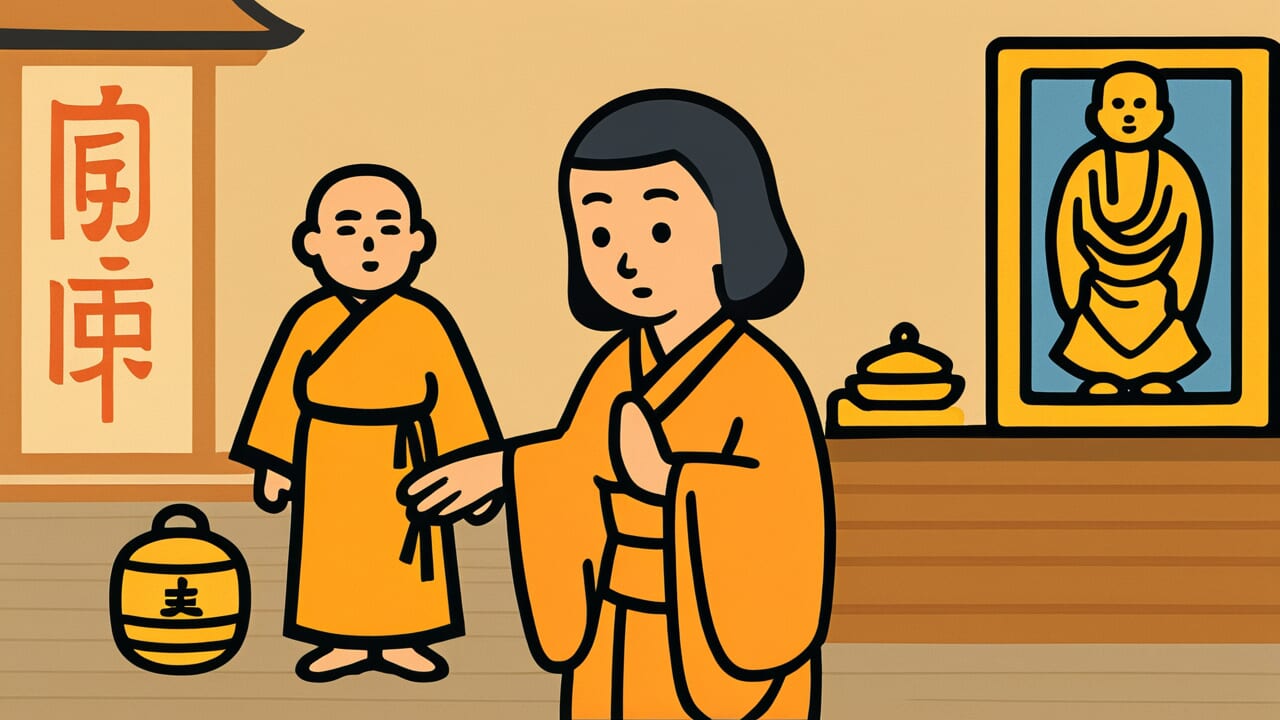How to Read “Women and priests have no leftovers”
onna to bōzu ni amari mono ga nai
Meaning of “Women and priests have no leftovers”
This proverb means that women and priests eat all their food without leaving anything behind.
In other words, when these two groups eat, they finish everything so completely that no leftovers remain. This is an observation about their eating habits.
For women, this refers to their role in managing household meals. They developed the habit of not wasting leftover food.
For priests, this reflects their spiritual practice. As part of their training, they show gratitude for food and never treat it carelessly.
This proverb expresses the attitude of “valuing food” that certain people possess. It’s not meant as criticism.
Rather, it’s a factual description based on observation. Today, people use it less frequently. But it still describes people who have the habit of not leaving food uneaten.
Origin and Etymology
No clear written records explain the origin of this proverb. However, people likely used it among common folk during the Edo period.
This expression pairs two seemingly unrelated groups: “women” and “priests.” It probably came from social observations of that time.
Women prepared and cleaned up after meals in households. People noticed they had the habit of eating leftovers rather than wasting them.
Priests followed Buddhist precepts and spiritual discipline. They were known for their attitude of gratitude toward food and their practice of finishing everything.
What’s interesting is how these two groups occupied completely different social positions. Yet they’re linked by the common trait of “not leaving food.”
This isn’t just a record of observation. It shows the sense of humor people had back then.
The Edo period was a time when the spirit of “mottainai” (what a waste) was deeply rooted in common people’s lives.
In this cultural background of valuing food, people who practiced this habit most thoroughly became crystallized in proverb form.
Usage Examples
- At the temple meal gathering, they say women and priests have no leftovers, and it was true—they cleaned their plates completely
- My mother embodies women and priests have no leftovers; there’s never been leftover food at our table
Universal Wisdom
The proverb “Women and priests have no leftovers” teaches us about the universal human sense of “mottainai” (wastefulness).
Why was this expression created and passed down through generations? Because the spirit of valuing food is a human virtue that transcends time.
When women managed food in households, the wisdom of not wasting leftovers was a necessity of life.
When priests practiced gratitude for food in their training, it was an expression of spirituality. Though their positions differed, both shared the attitude of “valuing what is given.”
At the root of this attitude lies essential human wisdom. People who know resources are limited naturally dislike waste.
People who can imagine the labor of those who produce food feel guilty about treating it carelessly. This isn’t logic—it’s a feeling that wells up from deep within the heart.
Our ancestors observed people practicing this virtue and preserved it in proverb form.
It’s not simply advice about saving money. It conveys the life truth of “living with a grateful heart.”
When AI Hears This
According to the second law of thermodynamics, entropy always increases in an isolated system. Order moves toward disorder.
For example, hot coffee left alone will always cool down. Nature’s basic tendency is to progress toward a “uniform and ordinary state.”
However, the “no leftovers” state this proverb points out goes in the opposite direction. A fresh, high-value state is constantly maintained.
From a physics perspective, this is characteristic of an open system. An open system is one where energy and matter continuously flow in from outside.
Living organisms are typical examples. Human body temperature stays at 36 degrees Celsius because energy flows in through meals.
Similarly, women and priests “not becoming leftovers” can be interpreted as continuous energy being poured in through social demand.
What’s interesting is the cost of maintaining this state. In thermodynamics, maintaining a low-entropy state always comes with a price.
Just as a refrigerator consumes electricity to preserve food freshness, maintaining a “no leftovers” state requires “energy investment.”
This includes maintaining appearance, managing reputation, and continuously generating demand. This proverb subtly shows that popularity and value aren’t maintained naturally.
They’re actually products of effort that defy physical laws.
Lessons for Today
What this proverb teaches you today is the value of “a heart that cherishes what is given.”
Not leaving food behind isn’t just a money-saving technique. It’s the ability to properly recognize and appreciate the value of what’s in front of you.
In modern society, food has become easy to obtain. But precisely because of this, we tend to lose sight of its value.
Behind the food items lined up in supermarkets lie farmers’ sweat, the efforts of distribution workers, and nature’s blessings.
If you can remember this, your approach to food will change.
What you can practice in your daily life is first knowing how much you can eat. Then make it a habit to finish everything.
This contributes to environmental issues. More importantly, it trains you to cultivate a grateful heart.
The accumulation of small actions will enrich your outlook on life.



Comments